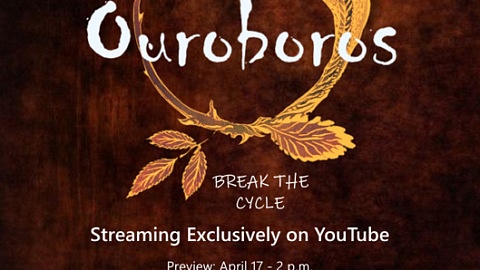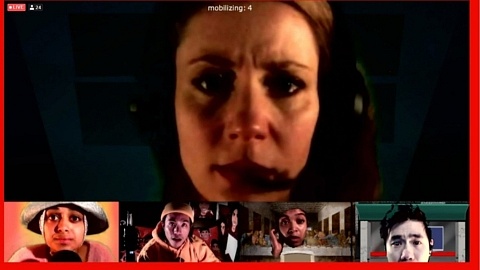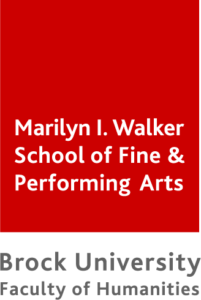Hello theatre creators, educators, scholars and everything in between! I hope you’re having a productive-yet-restful summer. Ever wonder what it’s like...
Behind the scenes at Shaw: Frances Johnson’s internship blog no. 1
Frances Johnson graduated from the Department of Dramatic Arts in 2020 and was about to begin an internship at the Shaw Festival when the Covid-19 pandemic halted live theatrical activity. Her internship in stage management is now happening this spring and early summer, as the Shaw Festival continues to navigate pandemic uncertainties while working towards a live 2021 season. Here’s her first internship blog post.
What was supposed to be a summer of 2020 internship is now in 2021. For obvious reasons I was unable to start my internship at the Shaw Festival last season but they graciously accepted me back this year. Of course, it still looks a little different as everything is still all online with the hopes to eventually bring these shows to the stage for live audiences.
During my time at the Shaw Festival I will be working with the Charley’s Aunt team. Charley’s Aunt, written in the late 19th century by Brandon Thomas and directed at Shaw by Tim Carroll, is a laugh-out-loud comedy following two men willing to do anything, or make their friends do anything, for love (the production’s poster art is pictured above). I will be working alongside stage manager Diane Konkin and assistant stage manager Ashley Ireland.
With everything happening remotely, I am really just a fly on the wall in rehearsals. Carroll instructs the actors on different exercises, as text work is all they can really do. This play was approaching its tech week last year when everything was shut down so apart from a few new actors still learning the blocking, the show is ready for the stage. Still, Carroll keeps rehearsal interesting (and short) by finding new ways for the actors to expand on their characters. It is still an amazing experience to watch this group of talented people every day.
I was fortunate enough to speak with Gabriella Sundar Singh, who plays Ella in Charley’s Aunt, about her time at Shaw and how it has changed in the pandemic.
Of course, all jobs look different in a pandemic, but I wanted to know specifically how creating a character and connecting with the ensemble has changed in our new digital world. According to Sundar Singh, it is not as hard as I thought. “I find whether you’re in the actual theatre space… or over Zoom, it’s the same work,” she says. She explains to me that, even when working on a live production, much of the work that goes into building her character is done outside of the rehearsal hall. Things like dissecting the play and doing your text work are done in your own time. Online, even creating a bond amongst the ensemble is still the same: “It’s still effort,” says Sundar Singh. Connections between castmates are never automatic, and always require work. It is about finding new ways to connect. Since she can no longer take a coffee break or walk home with someone, she finds other options. “The thing that changed the game for me was picking up the phone,” says Sundar Singh. These private moments with her colleagues are not possible over Zoom, but calling a castmate and just asking “How are you?” can be very important.
For Sundar Singh, creating theatre in a pandemic has made her rethink what is possible, even if it goes against her training. With new things being thrown her way such as operating her own tech or streaming with people all across the province, Sundar Singh relishes in the similarities between Zoom and live theatre. She tells me she gets the same jitters in front of her computer that she gets in the wings of the theatre. No matter the delivery method, the stakes are just as high. Sundar Singh disagrees with people who think this is not theatre. If anything, it made her think about the possibilities of theatre and question the ways it had been presented to her previously. She asks if we really have to touch, feel, and smell each other in order to make theatre. It’s all about adapting: “I don’t have time to sit around and pooh-pooh digital theatre and say that this is not what I went to theatre school for, I’m not trained for this, or I don’t like it… I’m adapting. This is what’s presented to me. This is how I get to hang out with my friends and do the work that I love so I’m rolling with it,” she says. Behind the scenes everyone is still putting their all into the work, and although it is OK to not love this medium, it is all we have right now.
As far as staying sane during this mess, Sundar Singh has found comfort in talking to her parents. She says even though they might not have a full grasp on what is happening in rehearsals it is still nice to blabber away about her day and talk freely. She reminds me that there is still an outdoor world and urges me to take advantage of time outside of work to look at the water and breathe the fresh air. Sundar Singh prefers to stay busy and relishes the new experiences that keep her on her toes. Even online, we still count on one another to get through the day or to complete a project. “I don’t have a choice to not be the best version of myself today because there are people relying on me,” says Sundar Singh. Knowing that our colleagues have trust in us is reason enough to show up and get the work done.
Bringing shows to the physical stage with live audiences might be further away than we thought — but we can still think about that day, right? Sundar Singh tells me that she and her colleagues at Shaw share true friendships, and it is the thought of being able to work with them again in person that excites her the most. She also looks forward to hearing the audience’s laughter during Charley’s Aunt. Although it is a comedy, she says there are many beautiful and tender moments the audience will be surprised by.
Even though restrictions seem to be forever changing and it is unclear when we will be back in a theatre, I am met with smiling faces on Zoom every morning, including Sundar Singh’s. The challenges and uncertainty these artists are facing does not seem to hold them back in any way. I am so thankful to be working alongside such talented and dedicated individuals.
Related Posts
The Brock Dramatic Arts department’s fourth year students have been working hard on their final production of this academic year. Ouroboros is a piece of...
Rick Roberts’ Orestes, directed by Richard Rose, confronts the progressively blurring lines between real life and virtual life in a heightened version of the...
The Brock Dramatic Arts department’s fourth year students have been working hard on their final production of this academic year. Ouroboros is a piece of...
Rick Roberts’ Orestes, directed by Richard Rose, confronts the progressively blurring lines between real life and virtual life in a heightened version of the...
Leave a Reply (Cancel Reply)
Twitter Feed
Blogroll
DARTcritics.com is partially funded by the Marilyn I. Walker School of Fine and Performing Arts, in support of student learning; experiential education; student professionalization; public engagement with the teaching, learning and production activities of the Department of Dramatic Arts; new ways of thinking; and the nurturing of links with our communities.

